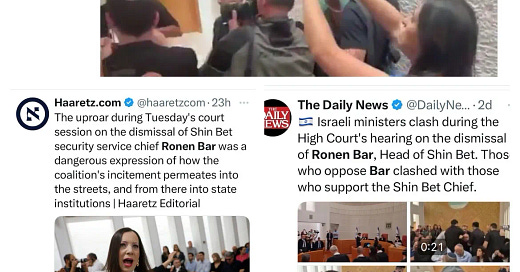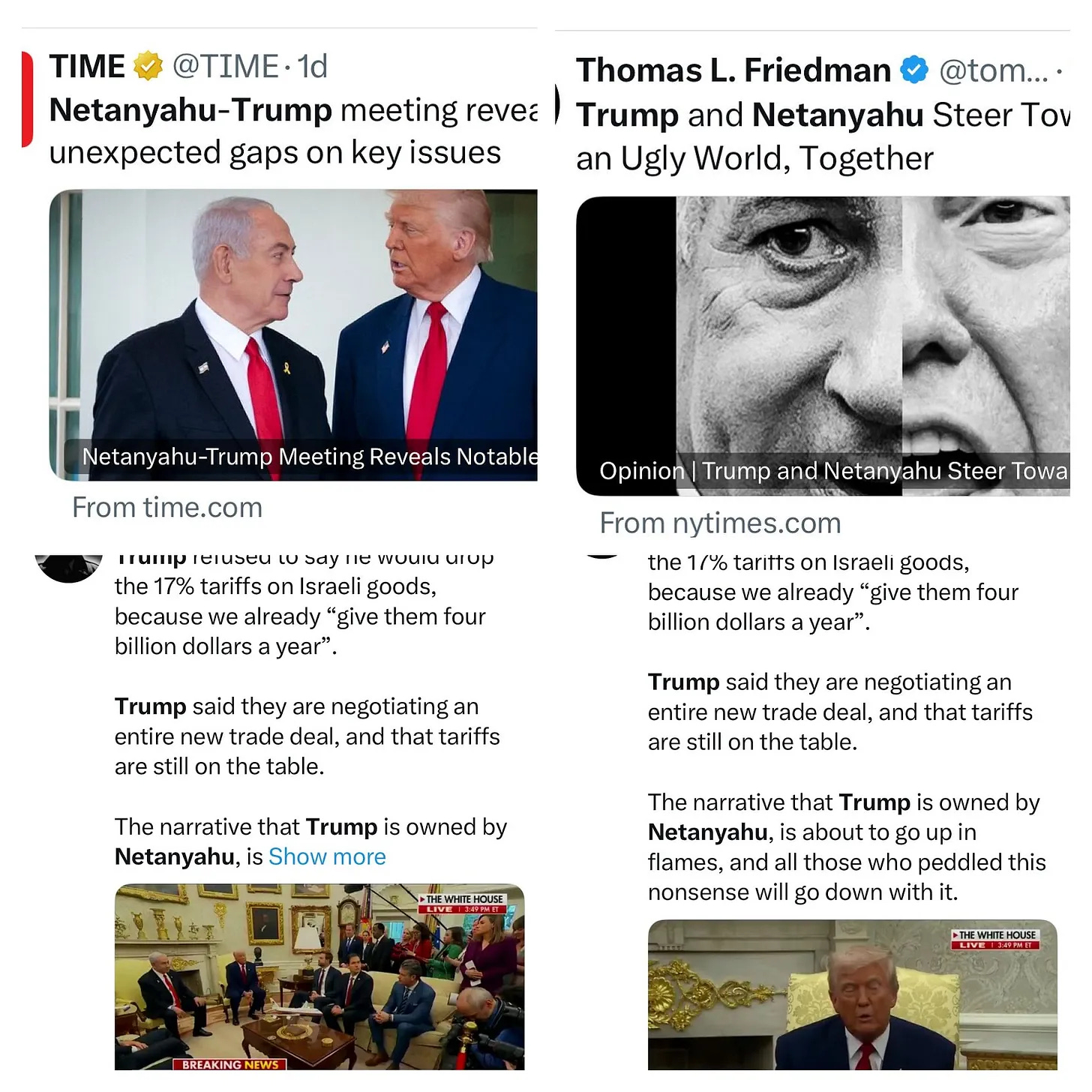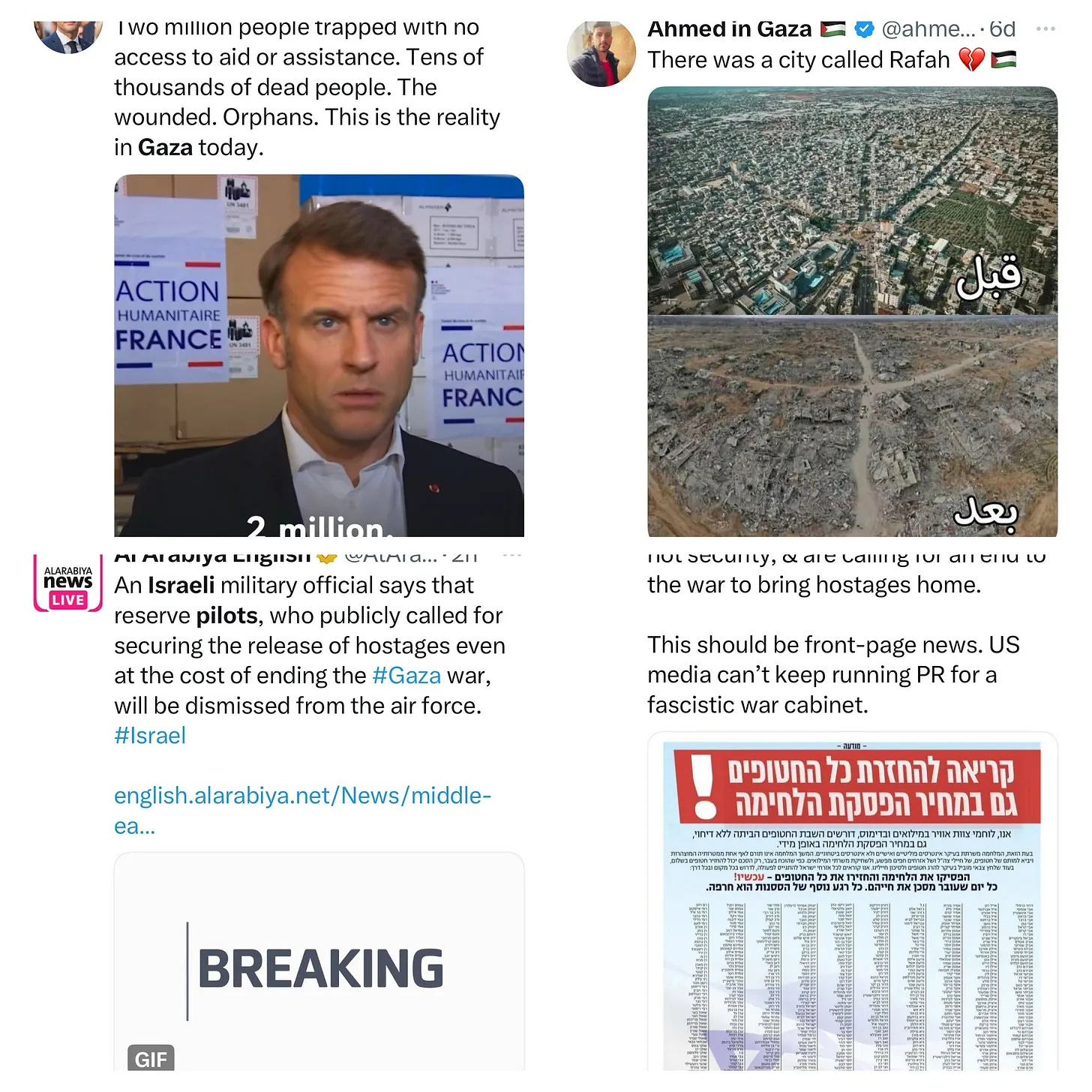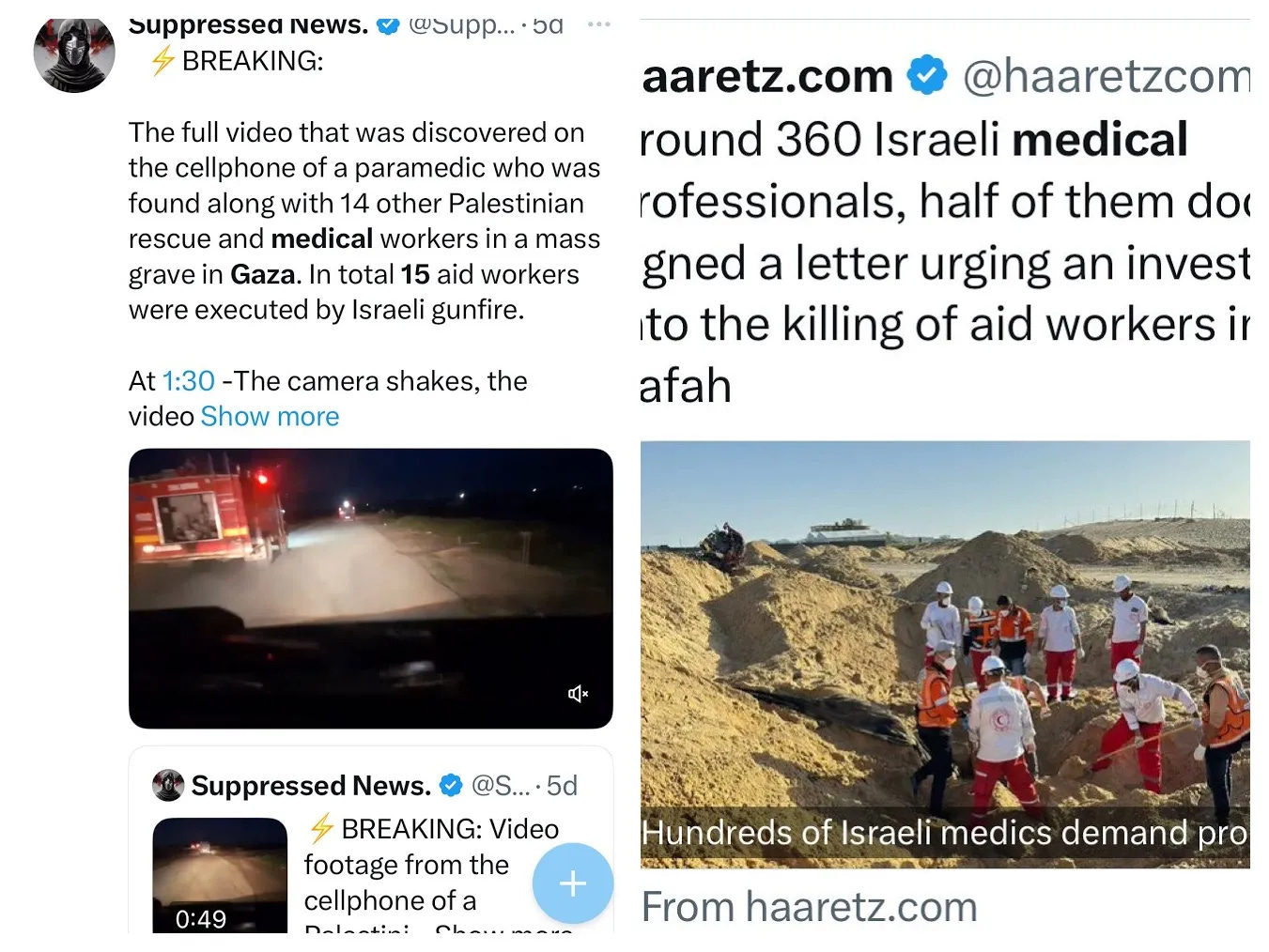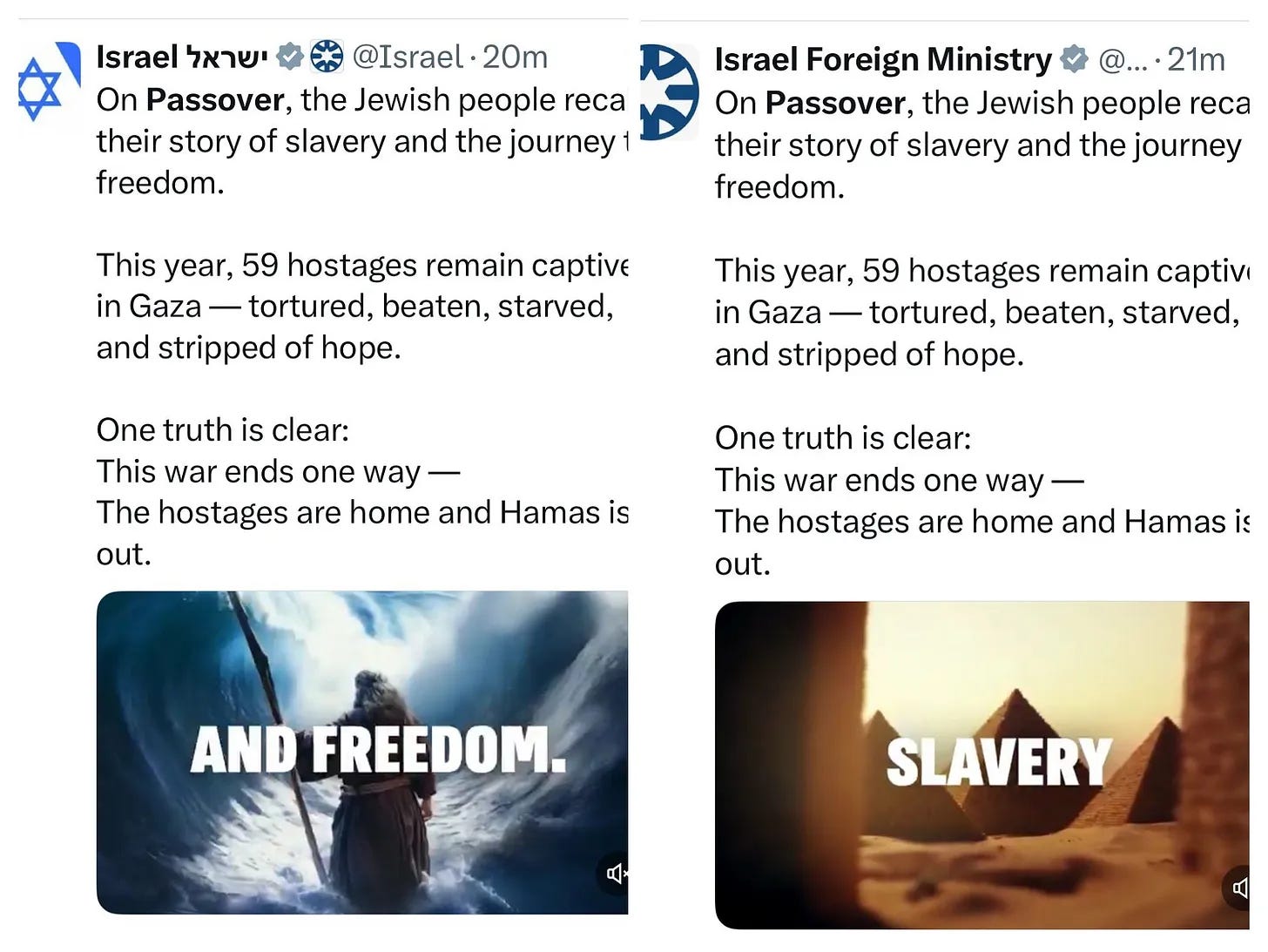Israel at War - Day 552
1. Supreme Court Ruling: PM Netanyahu Cannot Choose a New Shin Bet Director
After eleven hours of an intense hearing at the Supreme Court from several petitions against the firing of the Shin Bet Director, Ronen Bar, by PM Netanyahu and his government, the court ruled that until there is a final ruling by the court or a compromise between the PM and the Attorney General, Bar cannot be removed from his position.
The panel of judges included the senior judges on the Supreme Court: the president of the court, his deputy, and the next most veteran judge. Due to the extreme public awareness, public interest, and the topic which is at the center of the polarization between the government and the judicial institutions, between the government and other state agencies. Especially after the October 7th attack, PM Netanyahu and the government are doing all they can to throw all the responsibility for October 7 on the shoulders of the heads of state agencies, security institutions, and the heads of the Army, the Shin Bet, the Mossad, the Intelligence agencies and others. PM Netanyahu and members of his coalition continue to distance themselves from any responsibility. It reached a point where there is a far-reaching distributed conspiracy saying that all those people were conspiring behind their backs not to tell the PM and members of the government that Hamas was planning an attack in order to make the government fail and fall.
The reason PM Netanyahu gave for his decision to fire Bar was a lack of trust between the two. According to the law, the government has the authority to fire the Director of the Shin Bet. The question that was put to the court to decide was whether they needed a better explanation or if the breach of trust was enough.
The petitioners argued that trust was breached when the Shin Bet opened an investigation against PM Netanyahu’s close advisors, who are suspected of receiving money from Qatar to improve its image among Israelis. They briefed journalists about the importance of Qatar and the failure of Egypt during the negotiations with Hamas about the hostages, and that they were serving Qatar’s interest and not the Israeli interest. And allegedly the journalists did not know that the briefings originated from Qatar and not from PM Netanyahu. The Attorney General was against the firing of Bar. To support the position, Bar wrote a deposition to the court, saying that PM Netanyahu requested two unlawful requests from him. He asked Bar to issue a Shin Bet professional opinion stating that it was unsafe for him to appear in court for his trial and testify. Bar refused and said that there were no preventative factors. The other request was rather a complaint that the Shin Bet is not following and not investigating the protests against the government.
In addition, former Shin Bet Director, Yoram Cohen also issued a deposition to the court, saying that during his term, PM Netanyahu asked him to forbid Naftali Bennet, then a minister in PM Netanyahu’s cabinet, from receiving classified material because Netanyahu heard that Bennet is not trustworthy. Cohen refused.
The Supreme Court discussion was broadcast live for its eleven-hour duration. The court will give its ruling by April 20th. Until then PM Netanyahu is barred from nominating a new Shin Bet Director.
A few key members of the coalition have already announced that the PM and his government should ignore the court and nominate a new Shin Bet Director. This may be a critical moment for the very fragile and broken relationships between the government in office and the Supreme Court.
During the long hearing in court, there was a vocal protest and chaos, and the justices had to recess and continue without the public.
It is important to add here that Bar already took all responsibility for the failure of the Shin Bet on October 7th, and said that he would resign before the end of his term.
2. PM Netanyahu Meets President Trump to Discuss Iran and Trade Tariffs
Earlier this week, PM Netanyahu made a brief visit to Washington DC – following his weekend visit in Budapest – to meet with President Trump. The two leaders discussed Iran's nuclear plans and the trade tariffs imposed by President Trump.
Following the meeting, and in response to questions from reporters, Trump announced that the U.S. administration will start "direct" talks between the U.S. and Iran "at the highest level", adding that 'If the talks aren't successful, Iran will be in great danger." Trump also said that should the direct diplomatic channel fail, Israel would lead the military strike on Iran.
According to several analysts, the announcement of direct talks between the U.S. and Iran was a blow to PM Netanyahu, who has consistently opposed addressing the Iranian nuclear threat through diplomatic means.
Another issue that came up at the meeting was the trade tariffs of 17% imposed on Israel as part of Trump’s move to impose such tariffs on all goods imported to the US. According to analysts, Netanyahu was hoping that Trump would announce the cancellation or reduction of the tariffs, and announced that Israel would cancel all tariffs imposed on goods imported from the U.S. “very soon”. President Trump, however, did not state clearly whether he will drop the tariffs imposed on Israel: “Maybe not,” he said, adding: “Don’t forget we help Israel a lot. We give Israel $4bn a year. That’s a lot.”
President Trump since then has announced a 90-day extension on the enactment of the tariffs on most countries, except China.
At the meeting, Trump also commented on the future of Gaza and Gazans, saying that Gaza is "important real estate", adding that he envisages a “freedom zone” where “people won't be killed," and called on other countries to accept Palestinians. According to some analysts, Netanyahu continues to embrace the idea, even though it presents challenges from pertinent international and humanitarian laws.
3. The War In Gaza: Hundreds of Military Pilots Oppose the War, IDF Intensifies the Pressure on Gaza, Rockets Were Shot at Israel Again
A Rocket barrage was fired at southern Israel from Gaza earlier this week, sending tens of thousands of people to shelters and safe rooms again, as part of the end of the ceasefire.
The Israel Defense Force (IDF) intensifies the pressure on Gaza. Thousands of Palestinians were advised to evacuate the southern town of Rafah and move north, where they built a tent camp. Israeli forces intend to turn the southern area into a buffer zone. The Gaza Strip is totally isolated, neither food nor medical aid are going in. There is no electricity and hardly any clean water. Medical services are collapsing due to lack of supplies. The Human toll is rising and there is no way to assist and care for all in need. Israeli officials - PM Netanyahu and Defense Minister Katz - have announced time and again that they believe that only military pressure will force Hamas to go back to negotiations and accept a hostage deal.
The Israeli cabinet held a meeting late Thursday night, but the heads of the security organizations - the IDF chief of staff, head of the Mossad, and director of the Shin Bet - were not invited to the meeting. PM Netanyahu briefed the forum on his trip to Hungary and mainly Washington and his meeting with President Trump.
Meanwhile, a letter, signed by more than a thousand military pilots demanded that the government prioritize the hostages over the continuation of the war and eliminating Hamas. The head of the military air force announced that any active pilot who signs the letter will be discharged from duty. Only four pilots decided to erase their names. The polarization within Israeli society on the need to continue the war is deepening and penetrating the ranks of the IDF. This concerns the IDF senior leadership. Ending the ceasefire and initiating intensive combat operations in Gaza again places a heavy burden on the soldiers. It is obvious that the resumption of combat operations in Gaza cannot rely solely on the shoulders of the current soldiers serving their compulsory service, and at a certain point, the IDF will have to draft reservists. The motivation among the reservists is weakening after a year and a half of intensive war in all three battlefields: Gaza, Lebanon, and Syria. What seemed at the beginning an existential war, became for many a war with no focused targets and a war that aims to save the political status of the current government. Many accuse PM Netanyahu and his cabinet of not defining an achievable goal and not planning for the day after the war ends. Also, negotiations to release the hostages are not advancing. 59 hostages, 24 of them alive, are still held captive in Gaza. Hostages that were released lately are lobbying among world leaders and other influencers for their friends who were left behind. Some of them met with President Trump earlier this week.
4. IDF Faces Domestic and International Pressure to Investigate Killing of 15 Palestinian Medics
The pressure to investigate the killing of fifteen Palestinian medics came after the Red Crescent and the Gaza health ministry announced that they found a mass grave where the bodies of medical and rescue personnel were found after they were shot and killed by IDF forces on March 23rd. According to the Hamas-controlled health ministry in Gaza, some of the medics were cuffed when they were shot from close range.
In response, the IDF admitted to shooting the medics and rescue personnel, yet rejected the claims that the medics were executed, citing “a sense of threat” by what they identified as a Hamas police car carrying Hamas armed militants as the cause for firing at the rescue vehicles. The IDF also claimed that the vehicles were driving with their lights off. However, these statements were found to be untrue, as a video published by the New York Times showed that the rescue vehicles were clearly marked, had their emergency lights on, and the workers were wearing their yellow fluorescent vests when IDF forces shot them from close range.
The killing of medical and rescue personnel in wartime represents a severe violation of international law, and public condemnations and demands for a thorough investigation of the incident ensued. 360 Israeli medical professionals signed a letter to IDF chief Zamir demanding that he launches an investigation, stating that "we are shocked by this grave incident. The killing of rescue and medical personnel on duty is a blatant violation of international warfare laws, an act contrary to human morality."
British Prime Minister Keir Starmer also called for a probe into the incident. In an address to UK lawmakers, Starmer said: “there’s got to be an investigation,” adding that “we have to be absolutely clear that we’re not just talking about that isolated incident.”
The Israeli media reported that IDF chief Zamir ordered the military's investigative mechanism, to probe the killing of aid workers.
5. Passover 2025
The Jewish holiday of Passover marks the transition of the children of Israel from slavery to freedom, the exodus from Egypt, and the journey through the desert to the land of Canaan. On Saturday evening, millions of Jews in Israel and around the world will gather to hold the Seder the holiday’s festive meal, and read from the Haggadah, that tells the story of this journey.
On the eve of Passover, we mark 554 days since October 7th, 2023, when Hamas perpetrated an attack on civilian communities, army bases and an outdoor rave, killing 1,200 civilians and soldiers, wounding 3,300 and taking more than 250 men, women and children as hostages.
The following day, October 8th, 2023, Israel launched a military offensive on Gaza. According to the Hamas controlled health ministry in Gaza, at least 50,695 Palestinians have been killed, and hundreds of thousands have lost their homes and are internally displaced.
Thus, as we prepare to mark the season of spring and renewal, we remember all those who are suffering; the 59 hostages, dead and alive, still held by Hamas and Islamic Jihad in Gaza. The wounded, physically and mentally, and those who grieve for their loved ones. We mourn the loss of innocent lives in Israel, Gaza and the West Bank, and we hope for an end to war and a new journey towards reconciliation.

